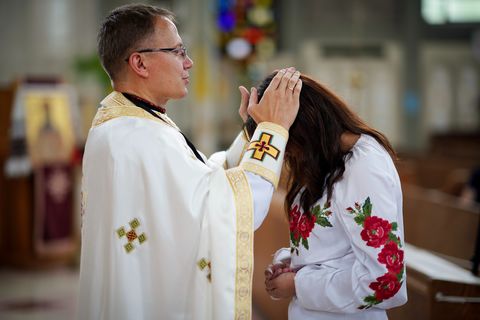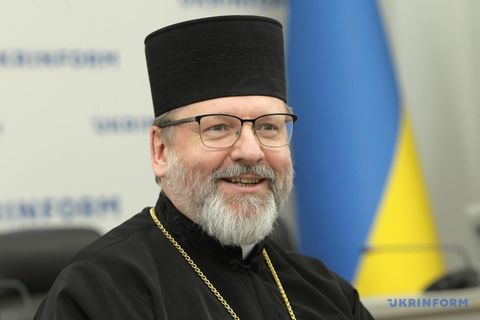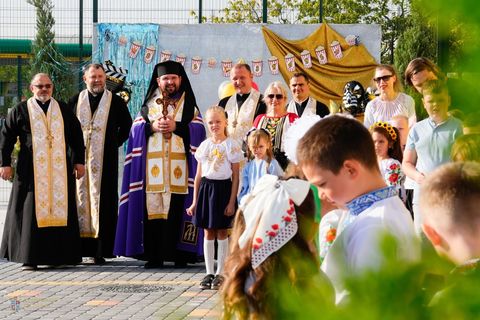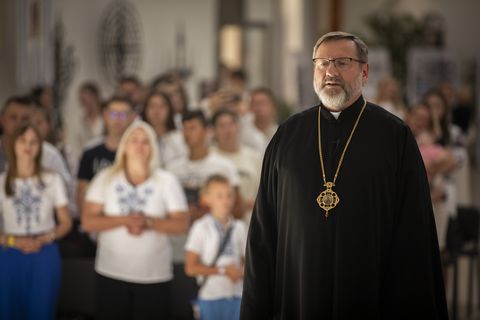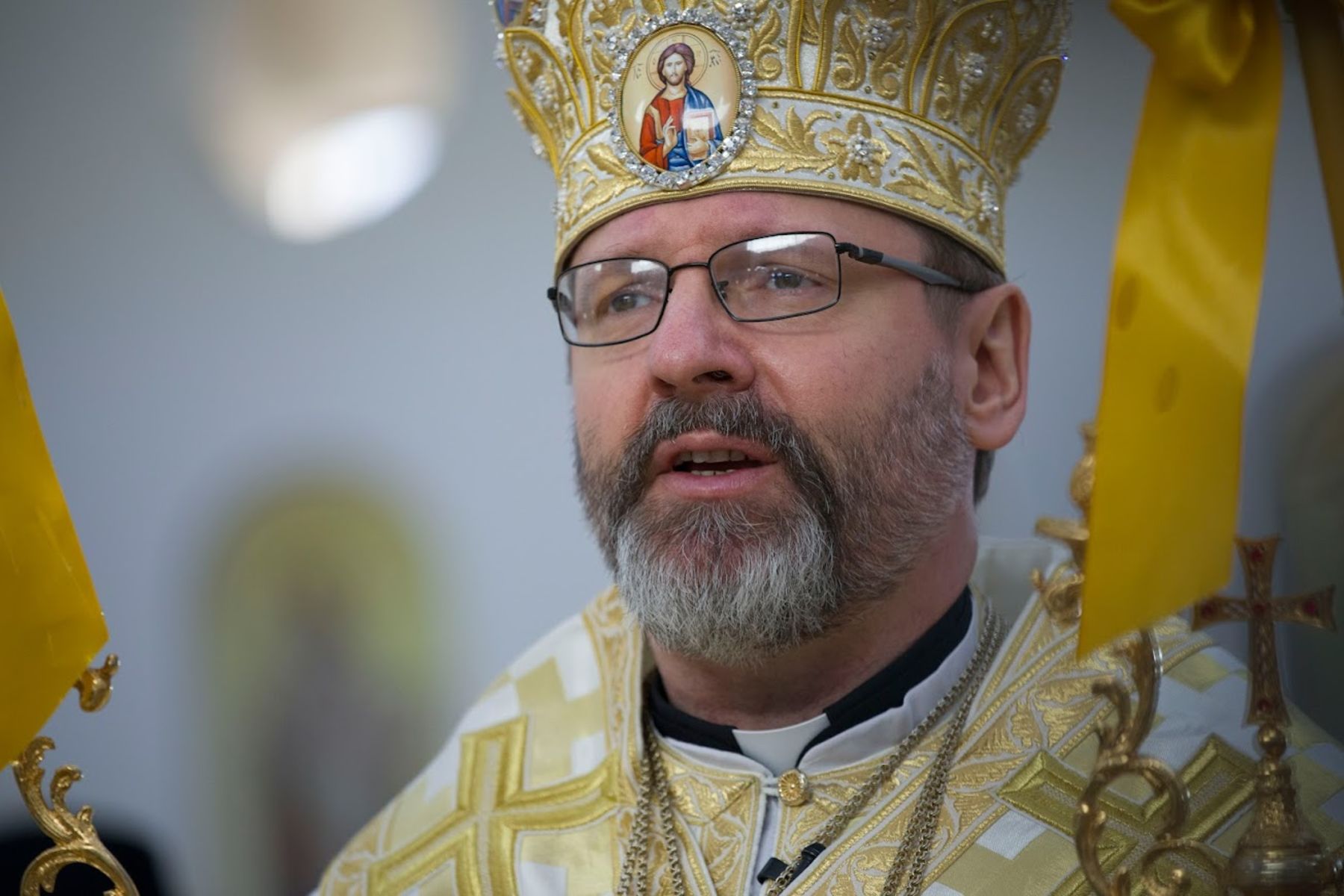
Wounded yet rediscovering itself: Head of Ukraine Church describes country 2 years on
Sviatoslav Shevchuk, head of Ukrainian Greek Catholic Church, in exclusive interview with Aleteia, sees his nation rediscovering its Christian heritage.
Ukraine is a wounded nation, but one that is rediscovering itself because of an existential threat, said the head of the Ukrainian Greek Catholic Church in an interview with Aleteia.
After 10 years of defending its territory against Russia, including two years of a full-scale invasion that has led to the largest humanitarian crisis in Europe since the Second World War, Ukrainians are tired — but determined to survive as an independent state, said His Beatitude Sviatoslav Shevchuk, who presides over the largest Eastern Catholic Church in communion with Rome.
War, as well, seems to be leading to a deepening of the faith for some.
Many Ukrainians are rediscovering that we are Christian as a nation, and to believe in God means to have a special vitality which gives us a special resilience in this situation
His Beatitude Sviatoslav, who is the major archbishop of Kyiv-Halych, spoke about how Ukrainians have a spiritual treasure in being able to contemplate the life-giving Word of God and receive the sacraments of the Church in the midst of extreme hardship.
In a 45-minute discussion, His Beatitude claimed that Russian President Vladimir Putin, who launched the invasion of Ukraine on February 24, 2022, does not believe in the existence of a Ukrainian state, a fact that Sviatoslav characterized as delusional. This stance, the patriarch said, is what is blocking the possibility of serious negotiations that would lead to an end of the war.
His Beatitude also spoke of his own “woundedness” and what it means to be a priest and bishop ministering to those who are traumatized by war. He also speculated on the need for forgiveness as part of the healing process that Ukrainians must go through. He detailed his vision of how such forgiveness might come about.
He also revealed that he will be visiting Washington, DC, and New York in early March.
The major archbishop spoke via Zoom from his office in Kyiv on February 15. A recording of the interview can be found here and at the end of this article. Following is a transcript, which has been edited for clarity.
Fewer Ukrainians
— Your Beatitude, what does Ukraine look like now, compared to two years ago?
Well, Ukraine is a wounded country. We have some territory occupied by Russians. Ukraine is a country with strife, trying to first of all liberate the occupied territories, trying to bring new hope to the people, trying to overcome the pain of those wounds which were received.
But also many cities and villages in Ukraine were destroyed, especially in the southern and the eastern part of Ukraine. Six million Ukrainians left Ukraine — basically women and children. The majority of them are staying in Europe and neighboring countries but there are fewer Ukrainians today than two years ago. It is even difficult to calculate how many people live today in our country, but there are more or less around 30 million Ukrainians living today in Ukraine.
— How do you see the defense of Ukraine going? How is your level of confidence? Do you feel that Ukraine will win in the end, because there’s been so much talk about the delay in military aid from the West and the fact that the Ukrainian military is having such a hard time with shortages of ammunition. How has your attitude changed since the beginning of the major invasion?
Well, in the beginning, we were really shocked because of this invasion. Nobody was prepared. Today, we are tired but we are not discouraged. We are wounded, but we will prevail because we have no choice. For us it is a matter of existence. And unanimously, the people of Ukraine do understand that there is no way we can build our future, how we can survive as a nation without defending ourselves. This is the most important feeling.
Of course, the pain of the wounds caused by war are growing. We do need worldwide support in order to be able to prevail. But the resilience of Ukrainian people is amazing. In those two years, we rediscovered ourselves a lot. We found how many, many heroes we do have as a nation. And those soldiers who died because of the freedom and liberty of our country, so many people who gave up not only their lives, but all their belongings. That is something very, very new and powerful. We remember in Western Ukraine those outstanding efforts for freedom and independence. But the rest of Ukraine, especially central Ukraine, northern Ukraine, eastern Ukraine, southern Ukraine, for many centuries considered Russians to be our brethren, our neighbors.
But today, this new society was born, a new nation with consciousness that we are an independent country, an independent nation, that we are different. We are rediscovering the millennium of our statehood. We are rediscovering the importance of speaking Ukrainian, the importance of preserving our cultural identity. Many Ukrainians are rediscovering that we are Christian as a nation, and to believe in God means to have a special vitality which gives us a special resilience in this situation.
So there’s this new manifestation of the Ukrainian spirit which is happening right now among us.
Today, we are tired but we are not discouraged. We are wounded, but we will prevail because we have no choice
— In what ways have the events of the past two years affected you, your personal life, your spiritual life? You have spoken a lot about the need to heal the wounds of war. Do you yourself feel wounded in any way from this experience? How are you, personally, and how do you take care of yourself?
Well, I am wounded. Anytime Russian missiles fly over my house, my first reaction is over-activity. I’m getting very active, because the intensity of my life has increased a lot. I never had an easy life as the head of the Church, even before the Russian invasion, but when the war started, my activity increased maybe 10 times. I’m always trying to give up myself for my people — being with them, especially in those dangerous situations.
I remember those first months of the war when we practically were surrounded here in Kyiv. I’m trying to inspire my people, but my question always was, “Lord, where are you in these circumstances?” I was trying to find signs of God’s presence among us, to inspire myself by finding him, and then as a bishop, as a believer, to show the way to God — present among us — to the others. That is what my life looks like today.
Also, I’m moving. I’m visiting. It is not enough to sit in your house and to pray. No, you have to be a very flexible and very dynamic person. You have to be everywhere, because people are expecting you to visit. And I can witness how important is the very presence of the priests and of the bishops among the suffering people. I would call this the sacrament of presence. Even if you can not do too much, you cannot even explain why it’s happening right now for those people, even if you have empty hands, it is important to be there, to be present. And this encounter reveals something which we do bring inside of our hearts.
It is interesting that on the Feast of the Presentation of Our Lord in the Temple, when St. Simeon says to the Virgin Mary, “The sword will pierce your heart, so the deepest thoughts of many hearts could be revealed,” if you experience pain, the very deep intentions of your heart are enlightened. When there is a war, sudden danger, all kinds of masks fall off. Many people reveal the authentic face, the authentic personal identity, the hidden intentions of his heart. I can testify that it’s happening.
Another thing which I really experienced: the power of the Word, because living in the midst of a culture of noise — too much information hitting you every day — we have missed the feeling of the importance, the power of a word. A word is not a simple vehicle of a message and information. A word is not a simple noise which helps me to communicate. A word is a power.
In the holy scriptures, we discover that the Word is the creative power of God. With His Word, God created the world. But the Word is also something which makes us humans similar to God the Creator. It is why very often we find in different books of the Bible, the expression that the Word is something which creates a new situation. [The Gospel and the Letter of St. James say] that at the end of human history, we have to give an answer, we have to respond to each word that went out from our mouth. Because if I’m cursing, even if I close my mouth, the curse is an evil power which will destroy again, will continue to destroy, a curse as a destruction — and a blessing, as the power of good which heals, which elevates the Spirit, brings hope.
And if you are a preacher, if you bring the Word of God, you can witness to how this power works out. And in the midst of war, what does it mean to be a bishop? First of all, to be a messenger, a bearer of God’s Word, a Word of the Gospel. I am witnessing the outstanding power of God’s Word, which heals, creates new situations, enlightens new perspectives, helps people to find God’s presence in their life, to increase their resilience, to inspire them.
But also, to be a bishop means to bring God’s grace and the power of the Holy Spirit, and to celebrate the sacraments. Without the sacrament of Eucharist and without the sacrament of penance, we would not survive. And there is some sort of conversion in Ukraine, asking for the meaning of our suffering, which we can rediscover by hearing God’s Word — holy scripture, the Holy Gospel — but also there is a conversion among so many people because they are seeking the sacraments of the Church. So many baptisms of people who never went to church. So many confessions — very touching confessions — which really converted the life of the people.
And also, we are trying to foster a new way of pastoral care. Maybe in the West, the biggest enemy of the Christian heart and soul is comfort, luxury, pleasure and how to withstand this consumerist culture. That is a big challenge. But in Ukraine, we are facing a different challenge. We are living in the midst of adversities, pain, tragedy, constant danger of death. There is pastoral service in the midst of grief and sorrow, pastoral care of people who are suffering, who are crying. It is not an easy kind of pastoral care, because very often you can say nothing. You can only be present, cry with those people and share their pain.
That pain affects you, because by sharing, you are bringing in your heart their pain. And you have to be careful what you will do with this, too much pain in your heart. This pain in a certain way contaminates you. And you have to pray.
This is how we are rediscovering in the midst of the pastoral way to accompany the sorrow, the importance of prayer, because prayer is not a symbol, a ritual, is not a simple ceremony. A prayer is a power which goes through your heart. Prayer is communion with God. Prayer is something which transforms you and the reality around you.
And we are witnessing how people are praying when bombs are falling on them. It’s interesting because many different psychologists also are trying to study such a situation, how people can live and overcome grief and sorrow. And many people would say, “Okay, it is normal that during the shelling of Russian missiles, people will be hiding in the bunkers, in the underground shelters, and they will be afraid.” But in the midst of this fear, it depends what the people are doing. If they are simply trembling, that fear can destroy them, worse than even the Russian missile, because a missile can go away and hit another city. But your fear can destroy yourself.
But if in the midst of this fear, you are singing, especially if you are praying, you will be able to transform your fear into a special energy which will give you a possibility to survive.
Maybe what I’m telling you is my personal experience — of the wounded person who’s trying to overcome his own fear, to find God in the midst of the pain, adversity, grief and sorrow. But that is our spiritual treasure that we are gathering, collecting right now as a people of faith.
And I can testify that hope comes only as a consequence of our faith. Only those who believe in God have hope. Hope is not a simple illusion or expectation. Hope is not a simple sentiment. Hope is a theological virtue which comes out from faith. And hope grows and can be fulfilled in the third important Christian virtue, which is love. Hope always brings us to love. And love is the biggest power which can transform and heal your wounds. Perhaps if you will only collect the pain and wounds and the other things in your heart with no transformation of this energy into the good deeds of love, charity, solidarity, this energy will blow up inside of you. But if you will transform this psychological trauma into positive activity, helping the others, you will help yourself.
I would call this the sacrament of presence. Even if you can not do too much, you cannot even explain why it’s happening right now for those people, even if you have empty hands, it is important to be there, to be present
“I’ve learned a lot about reconciliation”
— A moment ago you spoke about the sacrament of penance, which involves reconciliation. It’s often said that forgiveness is a vital part of healing and you have stressed this need for healing the wounds of war so much. There are so many people in Ukraine who have something to forgive: innocent people have been killed, homes destroyed, women raped — all kinds of atrocities throughout the war. Do you see forgiveness coming into play eventually in the healing process, as, God willing, the war ends, people will need to deal with these hurts and offenses. What might that forgiveness look like?
Well, I’ve learned a lot about reconciliation amidst this experience. First of all, I myself and the people of Ukraine understood that reconciliation first of all comes from your personal reconciliation with God. And forgiveness can be only shared. So I forgive you not because I’m so brave, I’m so good. No, I forgive you because I was forgiven before. So in order to be able to forgive, you have to experience forgiveness. It is why the Apostle Paul considered himself to be a messenger of reconciliation. And he started with a call to be reconciled with God. That is his message that he was bringing as the first and very fundamental one to those to whom he was preaching the Gospel of Jesus Christ: Beloved, please be reconciled with God.
So this is the vertical dimension of the reconciliation: If I’m reconciled, I can forgive. Not in the opposite way.
The second, very important truth about reconciliation and forgiveness is that we have to realize that the reconciliation which we are talking about right now, especially in the midst of war, is not the reconciliation of our ideas, of our way of thinking. We are not reconciled when we think in the same way; we do not simply coordinate our way of understanding the reality. It’s not reconciliation, because we can sign a peace agreement; we can more or less reconcile our ideas about how we will live in the future. But that will be the simple reconciliation of our mental categories. The reconciliation and forgiveness we are talking about is the reconciliation of the hearts, reconciliation of the human persons, the re-establishment and healing of human relationships. That is not an easy process. You can agree on some principles. Perhaps I can agree, Okay, my father passed away; he’s not right now beside me. But to accept this and to accept that there is no way to re-establish with him my personal relationship today as it was before, we have to go through this process of acceptance.
So the reconciliation between the people as a healing of our relationships is connected to overcoming the war trauma, which probably will mark us for decades in the future. And talking about the reconciliation and forgiveness between nations, it’s a long, long process of healing. The process of opening a dialogue of truth, the process of a rejection of a certain way of human behavior, it is why we have to investigate war crimes. And we are as two nations, Russians and Ukrainians, which will be neighbors for the future, because this is our geographical environment which God wants us to live, even in the future. So we have to reject a special, very, very specific… wrong way to establish the relationships between our nations. We have to process and condemn such a special way of behavior.
Then we have to give justice to the victims. We have to repair the damage we have done to each other. Only after that, we can speak about the agreement of our ideas, how we will cooperate in the future. And only then, as a fruit of healing, the restoration, can we speak about an authentic forgiveness.
So, that is a process of healing of human hearts. We cannot push it. But we have to pray, we have to work hard. And I think that the very notion of forgiveness and reconciliation is something deeply and authentically Christian. We as Christians cannot miss this important message of the Apostle Paul to be a people of peace and reconciliation with God and with our neighbors.
— Yesterday, you spoke at a press conference sponsored by Aid to the Church in Need. And you answered a question about the recent interview that Tucker Carlson conducted with Vladimir Putin. You said that you actually hadn’t seen the interview and that you didn’t really have the time for it. You said you would rather spend time listening to people affected by the war rather than listening to “such a crazy man.”
But I’d like to hear your views on some of the positions that Putin expressed, since Tucker Carlson has a significant following and influence in the US. And there is a sizable percentage of voters who are opposed to further funding of Ukraine and who are sympathetic with Putin. Some commentators I read said that Putin expressed views in this interview that he has expressed many times in the past, so I’m sure you’re familiar with his arguments. For example, could you respond to the following three points that he made, and I’ll take them one by one.
First of all, he said certain lands in eastern and southern Ukraine were historically Russian lands and Russia has a right to reclaim them.
Well, first of all, in these two years of the deadly war we developed our own way to protect ourselves, our hearts and minds against Russian propaganda, because that propaganda destroys you. And it is how we will have to take a special distance from any message or any interview which will go from the main creator of this propaganda — Mr. Putin. And that is simply how we protect our integrity, because war in Ukraine started not with tanks, missiles and bullets, but war started with a lie — a lie and distortion not only of the history but even the present time, the distortion of the future.
So of course, the first point of the Russian propaganda is to deny the very existence of the Ukrainian nation. So why won’t they have any kind of dialogue with the Ukrainian state as a subject of international law? Because they deny the existence of the Ukrainian nation. For them, Ukraine is territory, not a people, not a state, not a certain community with a historical background. For them, it’s a territory. So it is why talking about Ukraine, he started to talk about the territory. But in the same way, China can claim the territory of Russia. In the same way, Ukraine can claim that the northern part of the territory of today’s Russia was the kingdom of Kyiv — Kyivan Rus’, which in that century was present in the specific territory.
So to use distorted historical arguments, to say that we have a right to eliminate a people who live today in this territory is a crime.
— And you mentioned yesterday in the press conference that in places like Bucha, outside of Kyiv, when the Russians first invaded two years ago, they had lists of people who were artists and writers who were promoting the idea of a Ukrainian nation. And they were targets to try to eliminate any sense of a Ukrainian nation.
Yes, you know, this is not not the moment to present the authentic version of the past that we as Ukrainians view as our history, but what he was saying about the historical territories as Russian pretensions in Ukraine is a simple lie.
— Secondly, Putin argued that the United States and the West should stop supporting Ukraine militarily and enter into negotiations with Russia over ending the conflict.
Yeah, because for Russia ending the conflict means total destruction of Ukraine. The goal of this invasion was denazification and demilitarization, which means ethnic cleansing: Ukrainian territory without Ukrainian people, without a Ukrainian state, without those who will be able to defend their lives. So it is why he wants that Ukrainians will be either exiled or killed — simply disappear as a nation. So they will be able to end the war: existential war, total war, genocidal war, neo-colonial war.
Of course, in this way they confess that right now they cannot achieve their goals because Ukrainians are resisting, because Ukrainians receive worldwide support and solidarity. So he was conveying a message not only to the USA and to allies of Ukraine, but he was conveying a message to Ukrainians: “Give up. I am bigger than you. Be afraid. I’ll come and kill you.” That is simple blackmail.
And it is a pity to say, but right now, as I said previously, dialogue is not possible, not because Ukraine exists, not because the West supports Ukraine. But dialogue does not exist because Putin is not accepting the objective reality. If he and his political group accept the existence of the Ukrainian state, this dialogue, which can stop the senseless war, can start immediately. So in the beginning of the war, President Zelensky constantly was trying to foster dialogue with Mr. Putin, just to stop the senseless killing of people. But what we heard from the Russian side: “You have no right to exist, so you are not a subject of our dialogue.”
So the Ukrainian government, the representatives of President Zelensky understood that at this point the only thing we can do is defend ourselves. That is what Ukraine is trying to do right now, not because of the support and existence of Ukraine, which is an obstacle to start the negotiation, but the denial of the subjectivity and existence of the nation which counts millions of people. That is an authentic cause of this senseless confrontation.
— One last point. Some people have made the argument that if Russia prevails in Ukraine it will only feed Putin’s appetite for more land. In the interview, Putin claimed that he has no interest in invading Poland or the Baltic region.
Putin is bad in building some strategy, but he is good at fostering some tactical movements. So his first desire is to reestablish the Soviet Union. He gave precise orders to his people almost 20 years ago to move in that direction.
So his first goal is to reconquer, reestablish the Soviet Union. So not Poland, not the other Western countries, but Baltic countries will be the main target of Russia. But the reestablishment of the empire will only be the first step, then becoming that nostalgic, utopian empire of Great Russia again. They will try to impose their geopolitical interests on the rest of the world. So in his mind the image of the international relationships and the world order is the same which was created in the meeting of Yalta after the Second World War. They publicly declared that NATO has to go away from the Eastern countries, because that is the sphere of their interest, the so-called countries of the Warsaw Pact in the past.
So Putin wants to divide the world as it was in the time of the Cold War. The first step is to reestablish this Soviet Union and the second to reestablish Russia as a new Soviet Union, which we will be the world power imposing this geopolitical interest on the rest of the world.
So that is the Russian version of a very famous slogan in the USA: We will make Russia great again.
— One last question, Your Beatitude. You recently visited Canada. It was the first time you’ve been in North America since before this major invasion two years ago. Except for visits to the Vatican and other parts of Europe, the war has kept you pretty close to home. Will you be visiting any other parts of North America in the near future? What are your plans for international travel?
Well, if it’s the will of God, probably I’ll be visiting the USA in the beginning of March, because we have a session of the Permanent Synod of our bishops already called and prepared in Washington, DC, and we will conclude our session of the Permanent Synod in New York. That will be the nearest future. And then we will see.
— What are some of the concerns of the Permanent Synod right now? What issues are they taking up?
The Permanent Synod is a very special synodal instrument which helps the head of the Church to govern. This is the way of governance of the Eastern Catholic Church according to the Code of Canon Law for the Eastern Catholic Churches.
The main concern is the adequate pastoral response to the challenge of war. There are three priorities that we define as our pastoral priority for the next five years:
First, journey and accompaniment to the internally displaced persons and to the war refugees. We have to find where they are and we have to journey with them to protect them, to pay to them an adequate pastoral care.
The second, the healing of the wounds of the war with special training, special programs, special cooperation with psychologists, therapists, those who are providing rehabilitation to those who need it, and so on.
And the third one is family: the pastoral care for the Ukrainian family in the midst of war, because family as the sacramental union of man and woman is a very wounded institution in today’s circumstances. And we understand that the family is at the heart and future of Ukrainian society. And again, the pastoral care for the family is among our priorities right now.
Aleteia